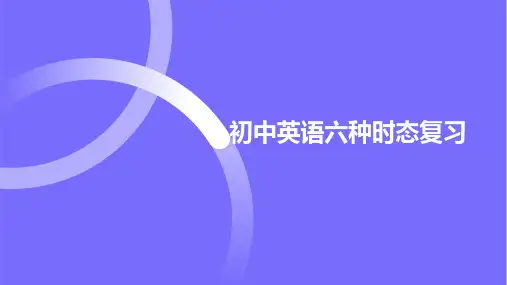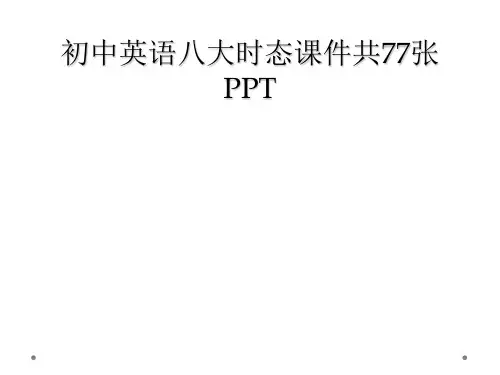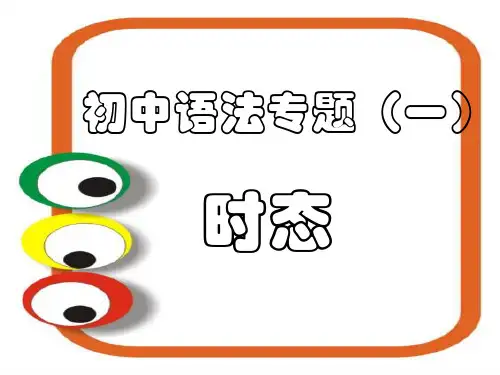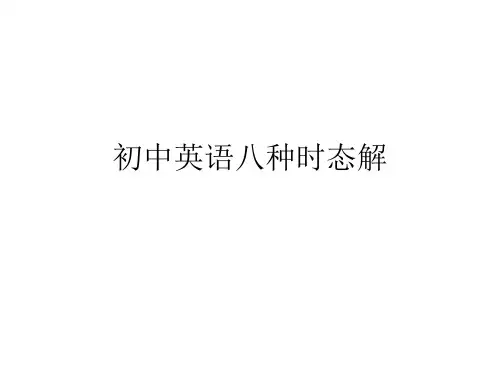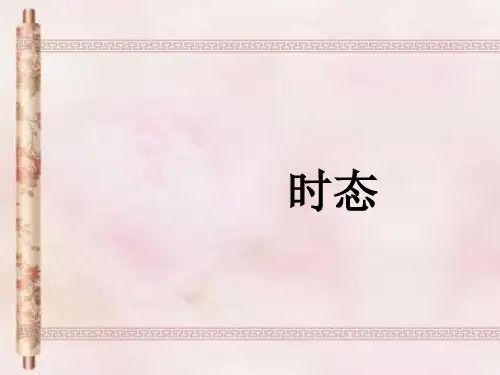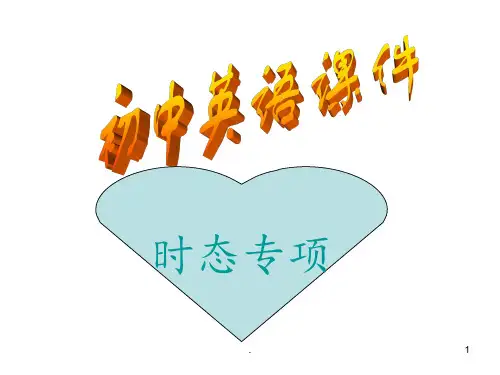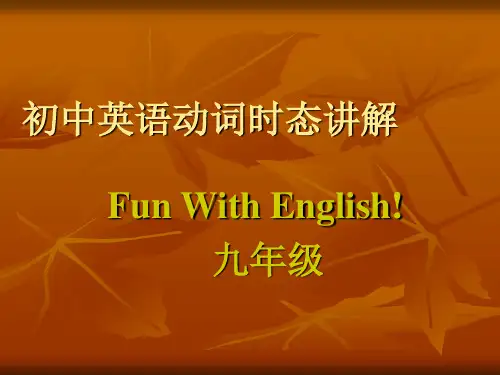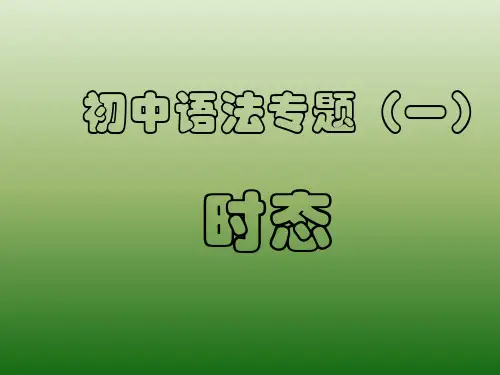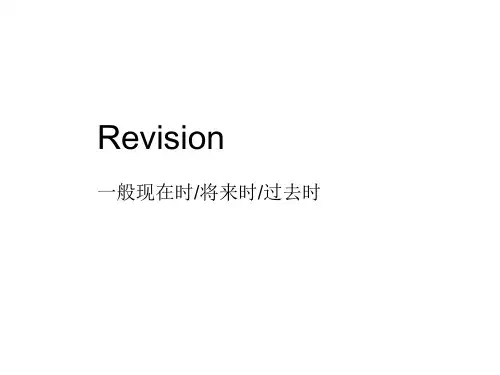- 1、下载文档前请自行甄别文档内容的完整性,平台不提供额外的编辑、内容补充、找答案等附加服务。
- 2、"仅部分预览"的文档,不可在线预览部分如存在完整性等问题,可反馈申请退款(可完整预览的文档不适用该条件!)。
- 3、如文档侵犯您的权益,请联系客服反馈,我们会尽快为您处理(人工客服工作时间:9:00-18:30)。
1.I _____(cook, cooked, was cooking, were cooking) breakfast when you arrived. 2.What ____you_____( do, did, was...doing, were…doing) at this time yesterday evening? 3.We_____(have, are having, had, were having) dinner when the doorbell rang. 4.While/ When/ As we____( have, had, are having, were having) dinner, the doorbell rang.
6. 用法:现在进行时表示
1)、现在(说话的瞬间)正在进行或发生的动作,强 调“此时此刻”。
E.g. He is reading . They are talking now.
2)、当前一段时间内的活动或现阶段正在进行的动作。 E.g. They are working these days. 3)、 某些动词的现在进行时,表预定的计划或即将 发生的动作。 E.g I am coming.
• 5.我妈妈在做sework. • 6.老师正在教我们如何用电脑。 • The teacher was teaching us how to use
computer.
过去进行时
1.概念:表示过去某段时间或某一时刻正在发生 或进行的行为或动作。
一般现在时 一般过去时 现在进行时 过去进行时 现在完成时 过去完成时 一般将来时 过去将来时
一般现在时
一、一般现在时:
概念:经常、反复发生的动作或行为及现在的某种状况。 时间状语: always, usually, often, sometimes, every week (day, year, month…), once a week, on Sundays, etc. 基本结构:①be动词;②行为动词 否定形式:①am/is/are+not;②此时态的谓语动词若为行 为动词,则在其前加don't,如主语为第三人称单数,则用 doesn't,同时还原行为动词。
A will B shall C do D are
5 He will have a holiday as soon as he _____the work next week.
A finishes B doesn’t finish
C will finish D won’t finish
6 There _____some showers this afternoon.
现在分词的变法有
1)、一般在动词词尾加上-ing ,E.g. jump 2)、以不发音字母e结尾的动词,先去e,再加ing. E.g have write 3)、.以重读闭音节末尾只有一个辅音字母结 尾的词,它前面是单个元音字母时要先将词 尾的辅音字母双写,再加上-ing. E.g. sit put 其句式变换都在be上做文章。
rain.
A will come; comes B will come; will come
C comes; comes D comes; will come
3 He will be back _____a few minutes.
A with B for C on D in
4 What time _____we meet at the gate tomorrow?
• 当我是个孩子的时候,我经常在街上踢足 球。
• When I was a child, I often played football in the street. • 4.我昨天完成作业了。 • I finished the homework yesterday.
现在进行时
作谓语的动词用来表示动作(情况)发生时间的 各种形式称为时态。
1 _____you ____a doctor when you grow up?
A Will; going to be B Are; going to be
C Are; /
D Will; be
2 I don’t know if his uncle _____. I think he _____ if it doesn’t
从句中用一般现在时表将来。(主 将从现) Lucy will be at home if it rains tomorrow.
大家应该也有点累了,稍作休息
大家有疑问的,可以询问和交流
动词第三人称单数 形式变化规则
1. He______(be, am, is, are) a teacher at No. 2 Middle School. 2. He______(have, has) classes in the afternoon. 3. He______(get, gets) up at half past six every morning. 4. He always _____(come, comes ) to school on time. 5. He ______(study, studies) very hard at his lesson. 6. One and two _____(be, is, are) three. 7. Blue and yellow _____(make, makes) green. 8. The earth _____(move, moves) round the sun. 9. I will go there if I ____( be, will be, am, is, are) free tomorrow.
A will be
B will have
C is going to be D are going to have
7 It ____my brother’s birthday tomorrow. She _____a party.
②表示主语通常的能力、兴趣爱好、和性 格特征。 I like reading.
③表示客观的事实或真理。 The sun always rises in the east .
. ④表示按照时刻表或已经计划安排 好的将来行为。(只限于是go, come, leave, arrive, begin, start, take off, stop, be 等表示开始或移动意义的词。) ⑤在时间状语从句和条件状语从句中, 主句用一般将来时(will+动词原形),
2.时间状语:at this time yesterday, at that time或以 when引导的谓语动词是一般过去时的时间状语等。
3.基本结构 主语+was/were +doing +其他 4.否定形式:主语+was/were + not +doing+其他 5.一般疑问句:把was或were放于句首。(第一个 字母大写) 其句式变化仍然要在be上做文章。
否定形式:主语+am/is/are not going to do ;主语 +will/shall not do+其他
一般疑问句:be放于句首;will/shall提到句首。 e.g. She will be back in three days.
She will not be back in three days. Will She be back in three days?
He likes music. He doesn’t like music.
一般疑问句:①把be动词放于句首;②用助动词do提问, 如主语为第三人称单数,则用does,同时,还原行为动 词。Does he like music?
什么情况下用?
①表示经常或习惯性的动作或存在的状态。 They go home once a week .
1.概念:表示现阶段或说话时正在进行的动作及行 为。 2.时间状语:Now, at this time, days, look. listen等时 间状语做标志。 3.基本结构:主语+be +doing +其他 4.否定形式:主语+be +not +doing+其他 5.一般疑问句:把be动词放于句首。
1.I ____(write, am writing, is writing, are writing) a letter now. 2.Look, it _____(begin, is beginning, am beginning, are beginning) to rain. 3.They ____(study, is studying, am studying, are studying) medicine at the Medical Institute of Chengde these days. 4.He _____(teach, am teaching, is teaching, are teaching) an English lesson at this time.
• 7. 昨天下午四点你们在打篮球吗? • Were you playing basketball at four yesterday
afternoon? • 8.他看书时睡着了。 • He fell asleep when he was reading.
一般将来时
构成:①will,shall+动词原形,其中shall只用于第一人 称。 ②be going to +动词原形,表示主观打算,按计划, 安排要发生的事情。 ③be to +动词原形,表示客观安排 ④ be about to +不定式,意为马上要做某事,正要 做某事。(不可与副词连用) ⑤某些动词,可用进行时态表将来,如come, go, arrive, leave。 ⑥在时间状语从句和条件状语从句中,主句用一般 将来时(will+动词原形),从句中用一般现在时表将 来。

